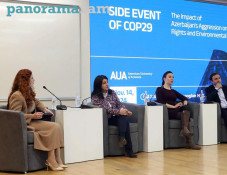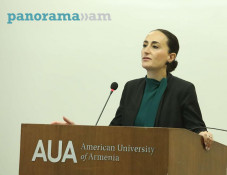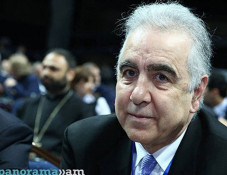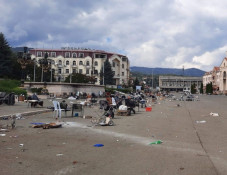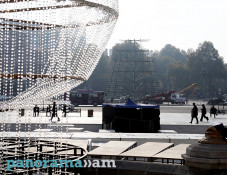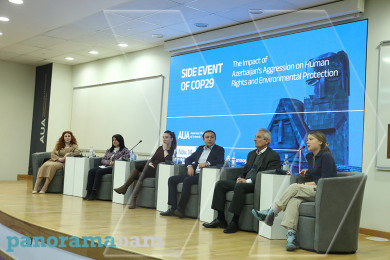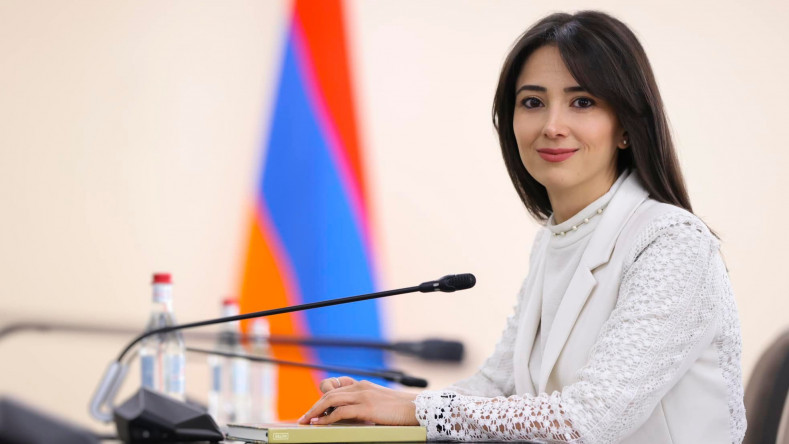
Azerbaijan occupied 150 sq km of sovereign Armenian territory after 2020 war, MFA spox says
Armenia has responded to a number of preconditions set forth by Azerbaijan for achieving normalization between the two countries, stating that Baku’s policies “do not contribute to reducing tensions and establishing peace in the region.”
Azerbaijan’s permanent representative to the United Nations recently advanced as many as eight preconditions to Armenia, including the withdrawal of Armenian troops from Artsakh (Nagorno-Karabakh), the Armenian withdrawal from eight occupied Azerbaijani villages and Armenia’s refusal to have territorial claims to Azerbaijan.
In written comments to RFE/RL’s Armenian Service regarding these preconditions a spokesperson for Armenia’s Ministry of Foreign Affairs said that “far-fetched narratives and demands of the Azerbaijani side are changing day by day, and not only for the Republic of Armenia, but, we think, also for the entire international community, it is already difficult to follow the speculations of the Azerbaijani side.”
Ani Badalian said that armed forces of Armenia served only in the sovereign territory of the republic. She stressed that the defense forces in Nagorno-Karabakh were made up of local ethnic Armenians.
“It is known that since the 1990s, in order to protect themselves against the aggression carried out by Azerbaijan and prevent mass violence against the civilian population of Nagorno-Karabakh, the Armenians of Karabakh formed the Defense Army, which still carries out its service in order to prevent the implementation of the mentioned operations planned by Azerbaijan decades ago,” she said.
“The Defense Army was and remains relevant only because of the ethnic cleansing policy pursued by Azerbaijan, including physical and psychological intimidation of the population of Nagorno-Karabakh, murders, periodic violations of the ceasefire, blocking of the Lachin Corridor, interruptions in the supply of food and medicine to Nagorno-Karabakh, disruptions in natural gas and electricity supply,” the representative of Armenia’s Ministry of Foreign Affairs added.
Commenting on Azerbaijan’s claim regarding “eight Azerbaijani villages occupied by Armenia,” Badalian reminded that still back in the 1990s Azerbaijan occupied the Armenian village of Artsvashen, the arable lands of the villages of Vazashen and Aygeovit in the Tavush region and 70 percent of the arable land of the villages of Berkaber and Paravakar. She said that after the 2020 war in Nagorno-Karabakh, as a result of renewed aggression, Azerbaijan occupied another 150 square kilometers of sovereign Armenian territory.
“It is surprising that about the occupation of territories by Armenia speak officials of a country, the top leadership of which openly makes claims regarding the sovereign territories of Armenia, sometimes also stating that there is no border between Armenia and Azerbaijan and therefore it is not violated as a result of the advancement of their armed forces. The president of Azerbaijan has repeatedly openly admitted the occupation of the territories of the Republic of Armenia, threatening to seize new territories through the use of force if his maximalist demands are not met,” she said.
The spokesperson of the Armenian Ministry of Foreign Affairs also noted that Armenia’s calls to Azerbaijan to respect the border recognized by both countries in the Alma-Ata Declaration adopted by former Soviet republics amid disintegration of the USSR in 1991, as well as to provide legal justifications for claims regarding some of the mentioned villages remained unanswered.
“Moreover, the proposal of the Armenian side on a mirror withdrawal of troops from the 1975 border, which would definitely help to reduce border tensions and solve a number of existing problems, also remained unanswered,” she added.
The representative of the Armenian Ministry of Foreign Affairs also stressed Azerbaijan’s “changing narrative” on the situation with the blocking of the Lachin Corridor, the only road connecting Nagorno-Karabakh with Armenia.
“Azerbaijan first said that the corridor was not closed, then that the corridor was closed by so-called “environmentalists”, then when it was announced that the mine that was the subject of the dispute had stopped its activities, the persons acting as “environmental activists” demanded inspection of Red Cross vehicles and humanitarian cargoes passing along the corridor. Further, these actions began to be justified by fictitious transportation of landmines, then, after the decision of the International Court of Justice, they again began to declare that the corridor was open, and already on April 23, having taken steps in the Lachin Corridor to install a checkpoint, which was a flagrant violation of the tripartite statement of November 9, 2020, they demonstrated the real purpose of the staging organized at the state level for several months,” Badalian said.
In conclusion the spokesperson of the Armenian Ministry of Foreign Affairs said: “Armenia is convinced that it is only through constructive dialogue that solutions to all problems can be achieved, but the policy pursued by Azerbaijan clearly does not contribute to reducing tensions and establishing peace in the region.”
Newsfeed
Videos





